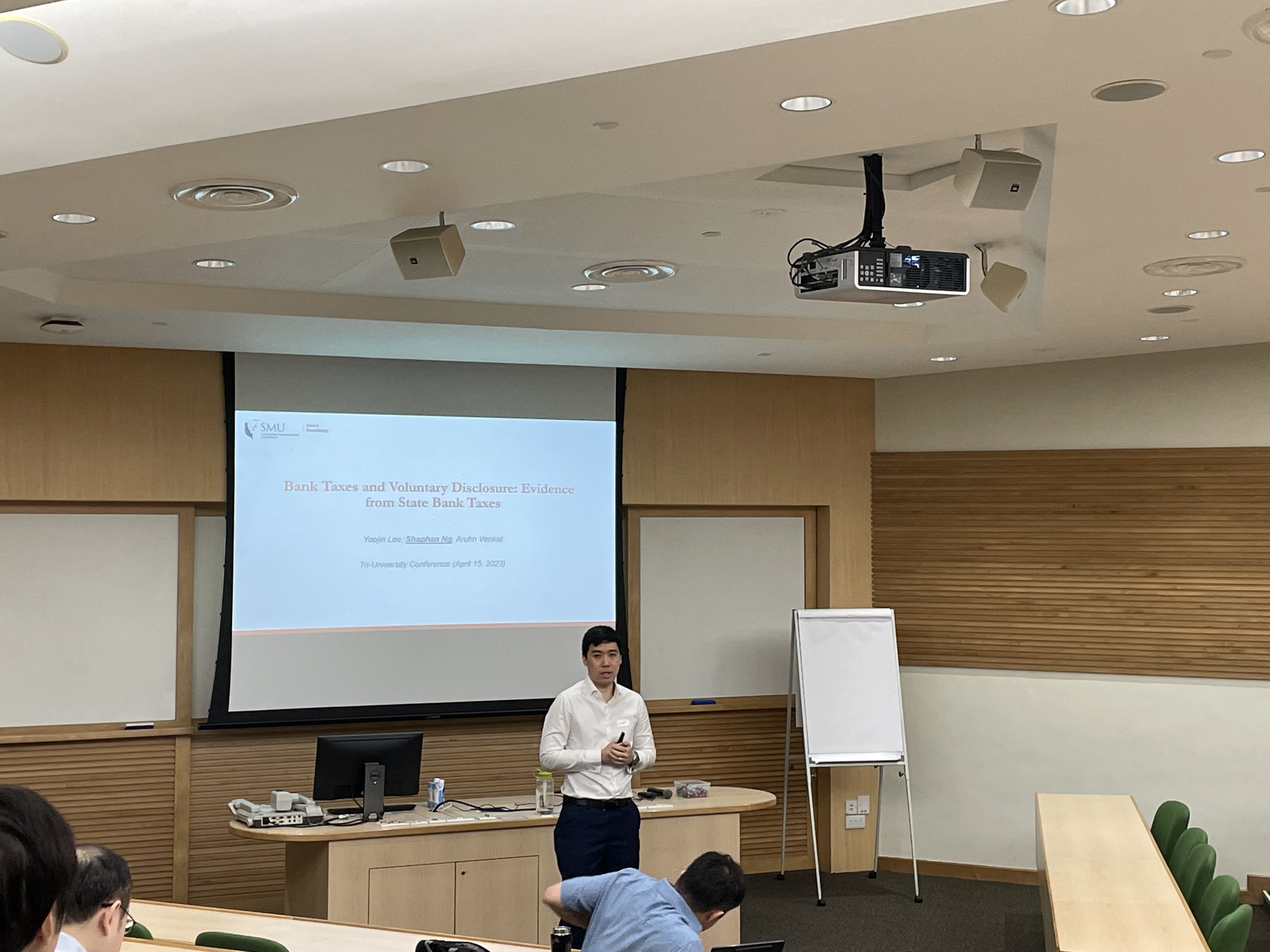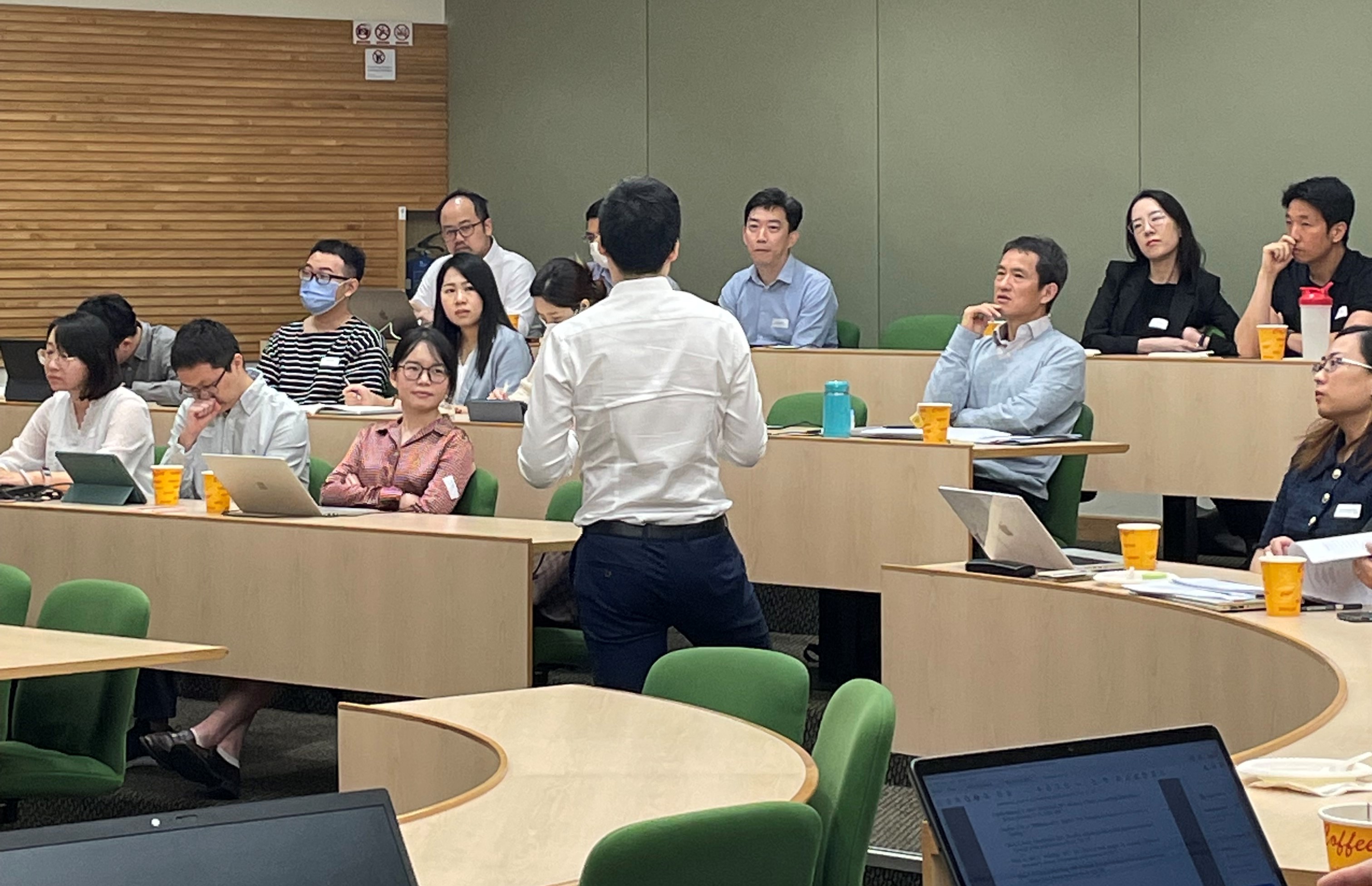
Assistant Professor of Accounting David Samuel presenting his paper, titled “Monitoring and Tax Planning – Evidence from State-Owned Enterprises”
As the adage goes, there are only two things certain in life: death and taxes. While eventual mortality is largely out of human control, understanding the intricacies of bank tax and monitoring how government-owned corporations plan their taxes can be useful for both policymakers and the public. Such activities can have significant impacts on economic growth, financial stability, and social welfare.
The two papers presented by Singapore Management University’s (SMU) faculty — “Bank taxes and voluntary disclosure: Evidence from state bank taxes” and “Monitoring and Tax Planning – Evidence from State-Owned Enterprises” — at the Tri-University Accounting Research Conference 2023 certainly comes at a critical juncture as finance professionals need to be on the front foot to address ever-changing tax challenges.
The annual event was hosted by Nanyang Technological University (NTU) on 15 April 2023, and was attended by faculty from Singapore Management University, Nanyang Technological University, and the National University of Singapore.
First introduced in April 2012, the Tri-University Accounting Research Conference aims to champion the research of assistant professors; thereby igniting collaborations among junior and senior faculty while providing a platform for the lively exchange of ideas and feedback.
At this year’s conference, six papers touching on subjects ranging from patents and bank taxes to liquidity covenants were presented by faculty from the three universities, who saw the conference as an invaluable opportunity to gain feedback on their research.

Assistant Professor of Accounting Shaphan Ng presenting his paper, “Bank taxes and voluntary disclosure: Evidence from state bank taxes”
A look into how bank taxes affect borrower disclosure
During the morning session, Assistant Professor Shaphan Ng from the SMU School of Accountancy presented his paper, “Bank taxes and voluntary disclosure: Evidence from state bank taxes”, which was co-authored with Assistant Professor Yoojin Lee from California State University’s College of Business, and Assistant Professor Aruhn Venkat from the University of Texas McCombs School of Business.
Bank taxes play various roles in a financial system. First, it serves as a revenue generator for governments with such policies, for example the UK and France. These taxes can take different forms, such as a percentage of profits, assets, or liabilities; and are often used as a tool for regulating the behaviour of financial institutions. By incentivising certain activities or discouraging risky practices, governments can create a more stable financial environment.
In the paper, the authors examined the effects that bank taxes have on voluntary disclosure of borrower firms.
“Essentially, what we are really trying to find out is whether the effects of bank taxes spill over from the banks to the borrowers,” explains Prof Ng.
“Bank taxes are a taxation on a critical institution in our economy. Banks act as intermediaries to capital formation and allocation.
Based on prior literature, we find that bank debt takes up a substantial portion of borrowers’ debt financing, external financing and firm value. Studying how bank taxes affect this form of credit supply is not just interesting, but can also lead to policy implications.”
Over the past decade or so, various governments have tried to implement bank taxes, to varying success. In 2010, then-US President Barack Obama proposed a bank tax called the “Financial Crisis Responsibility Fee”, through which he hoped to impose a fee on financial firms with S$50 billion or more in consolidated assets. This proposal received mixed support, and was not enacted.
Across the Atlantic, the UK announced the “Bank Levy”, which was a tax levied on the balance sheets of banks and other financial institutions, mostly their debts. The bank levy took effect from January 2011, and has been in place ever since.
Explaining the results of the study, Prof Ng and his co-authors found that bank taxes are positively associated with corporate voluntary disclosure — the practice of firms voluntarily disclosing information about their financial status, operations, and risks.
“Firms may increase voluntary disclosure to cater to external capital providers to reduce the costs of external financing,” he explains.
One of the effects of bank taxes is that they reduce the profitability of banks. This can lead to a decrease in the amount of money that banks have available to lend to borrowers, such as individuals and businesses. When the supply of bank loans decreases, borrowers may find it more difficult to obtain the financing they need to fund their projects, expand their businesses, or make large purchases.
By providing more information voluntarily, firms can cater to the requirements of external capital providers such as banks, which may prefer to invest in companies that are transparent and open about their operations and financial performance. This voluntary disclosure also serves to reduce the firm’s credit risk and decrease the monitoring costs for lenders.
“We want to provide some policy perspective that this is evidence of an unintended consequence of raising bank taxes, given that it is such a politically popular tool. By documenting the effects, our study should provide important policy implications,” Prof Ng concludes, drawing his presentation to a close.

Assistant Professor David Samuel preparing for his presentation
The impact of monitoring on tax planning
When it comes to taxes, it seems part of human nature for organisations and individuals do their utmost to reduce the amount that they have to pay. Kicking off the afternoon session of the conference, Assistant Professor David Samuel from SMU’s School of Accountancy presented his paper, titled “Monitoring and Tax Planning – Evidence from State-Owned Enterprises”.
Co-authored with Professor Eva Eberhartinger from WU Vienna University of Economics and Business, the paper examined the effects that a state owner’s monitoring incentives had on a firm’s tax planning, specifically looking at state-owned enterprises’ (SOEs’) in Germany. SOEs include firms whose majority shareholder is a government entity of any government level, whether this is the federal, state, or municipal level.
“Studying the role of state ownership in tax planning is important — more than 10 per cent of Forbes 2000 firms are categorised as SOEs,” says Prof Samuel.
Contrary to what one might believe, state ownership in and of itself does not imply less tax planning. “The Dutch national railway company, which is owned by the Dutch government, apparently engaged in some sophisticated tax planning activities using Irish subsidiaries to lower their tax obligations,” Prof Samuel shares as an example. By finding workarounds like transferring funds to subsidiaries in tax havens, companies juggle their balance sheets to the end of reporting lower tax amounts.
Elaborating on the timeliness of this study, he continues, “During the COVID crisis, many companies needed government injections, but some of these companies were found to have allegedly paid less taxes than what they should have in the years prior. This started the notion to tie potential government aid to the companies’ tax planning activities, and only providing aid to those who had not engaged in tax planning.”
The findings from the study showed that monitoring incentives of the state owner are an important determinant of the SOEs’ tax planning activities.
“We find that SOEs with state owners that stand to benefit from the tax revenues were found to engage in less tax planning,” shares Prof Samuel.
“Our results indicate that lower tax planning activity of SOEs may be facilitated if the state owner has a claim on the tax revenues. In federal tax systems, stronger monitoring or even coordination among state owners should be encouraged to ensure adequate tax payments from all SOEs.”
